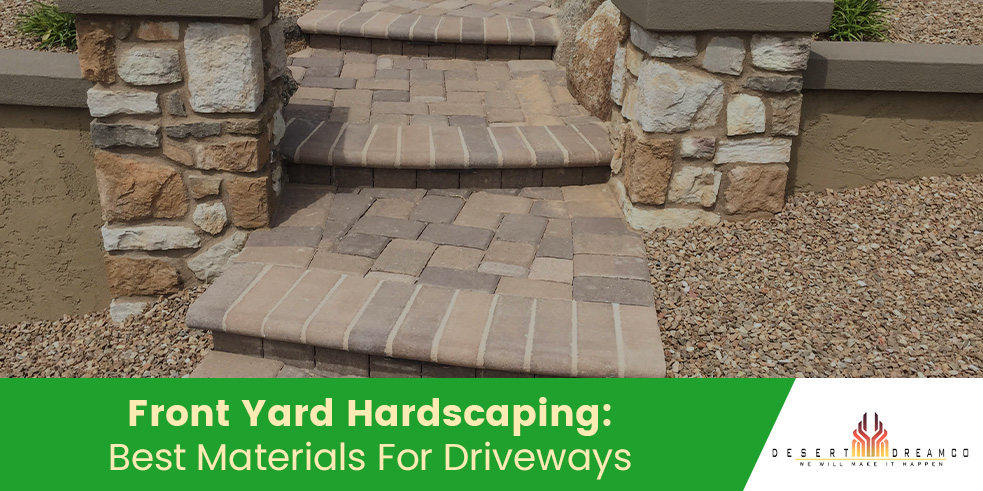Front Yard Hardscaping: Best Materials for Driveways
Did you know that a paved driveway can increase the value of your home?
The exterior of your home plays a significant role in your home’s curb appeal.
From your house’s paint to your landscaping, you can’t discount the importance of improving the outside of your house.
While you’ve likely heard the term “landscaping” quite often when reading about home improvements, front yard hardscaping is equally important.
But, what exactly is front yard hardscaping? In what ways does my driveway play a part in hardscaping?
Our hardscaping guide will go over the basics of hardscaping.
We’ll also discuss the best materials you should choose for your driveway to increase your home’s value.
What Is Hardscaping?
Hardscaping refers to the non-living components in your landscaping.
Hardscaping can include the following elements:
- Benches
- Fences
- Driveways
- Walls
- Patios
Hardscaping is one of the two subcategories of landscaping.
The other category is “softscaping.”
Softscaping refers to your outdoor space’s organic and living elements, such as grass, flowers, and trees.
Hardscape elements can help enhance your property.
One of our hardscaping tips is paving and improving your driveway.
Your driveway can define your space while leading visitors to certain areas of your property.
A well-paved driveway will also give people a space to drive their vehicles without damaging your property.
There are four categories of surfacing materials that are commonly chosen for driveways.
Figuring out the best material for your needs involves various costs.
Let’s go over the top driveway materials.
Concrete
Concrete is an excellent option if you’re looking for something with long-term durability.
A concrete driveway, when properly maintained, can last you anywhere from 25 to 50 years.
Concrete is sometimes called cement, but they’re not the same.
Concrete is much stronger than cement.
Cement is usually reserved for decorative, smaller projects.
Concrete is created by blending cement, water, gravel aggregate, and sand.
It’s poured between forms while it’s wet.
The concrete is then left to harden into a durable paving surface.
One of the great things about concrete is that it can be colored to your specifications.
It can also get stamped in various designs, often making the concrete look like natural stone.
Concrete driveways are prone to water damage and cracking unless adequately sealed.
They’ll also show stains, such as tire marks, mildew, oil, and rust.
The stains can get removed with pressure washing by an experienced professional.
Asphalt
An asphalt driveway is an excellent option if you’re not concerned with the appearance and color of your driveway.
Asphalt is a mixture of tarry asphalt, aggregate, and sand.
The mixture gets heated and laid over a compactable gravel base.
The gravel base allows for drainage while providing support.
Asphalt driveways tend to be less expensive than other options.
Remember that site preparation, such as laying the base and removing your old driveway, can increase the cost.
An asphalt driveway can also last up to 20 years.
Regular patching and sealing can extend its lifespan.
The driveway’s surface can get relayed if it becomes damaged.
Gravel
If you have a rustic landscape and home style, a gravel driveway might be an excellent option for you.
Gravel is one of the least costly paving materials. The gravel just needs to get spread over a flattened and prepared base.
Gravel is typically used for rural houses that have long driveways.
Having a concrete or asphalt driveway in those scenarios might be cost-prohibitive.
Driveway gravel is typically sorted aggregate or crushed rock. The pieces range from one to two inches in diameter.
There are different gravel colors available, but your choices might be limited to rocks that are native to your area.
For example, your options might include crushed granite, river gravel, or limestone.
One downside of gravel driveways is that they can develop potholes.
Maintenance and repairs of gravel driveways are relatively straightforward.
This type of driveway can last for up to 100 years if the gravel gets replenished.
Pavers
One visually appealing material for driveways is pavers.
Pavers include various manufactured clay, natural stone, or concrete bricks.
Pavers for driveways come in multiple designs and sizes.
Some common driveway paver designs include:
- Natural cobblestones
- Rectangular brick pavers
- Hexagonal pavers
- Concrete pavers
Drive pavers can be highly durable.
Even if one of your pavers gets dislodged or breaks, the repair process is easy.
The paver can get individually replaced instead of repairing the whole driveway.
Things to Think About When Selecting a Driveway Material
One of our pieces of hardscaping advice is to narrow down your material of choice based on your most important priorities.
Below are some factors to consider when making your final decision.
Maintenance
If you don’t want to have to conduct routine maintenance, you’ll want to pick a low-maintenance option.
For example, asphalt is an excellent choice if you don’t want to worry about keeping up its appearance.
You need to think about how much time and money you want to commit to your driveway.
Style
Think about your home’s design and your existing landscaping.
You want to choose a driveway material that will integrate seamlessly with your outdoor space.
Many driveway materials have multiple design options to fit your needs.
Price
Your budget might determine when deciding what material to go with.
Don’t be discouraged if you’re on a budget.
There are plenty of cost-effective options for creating a beautiful driveway.
Climate
Some materials aren’t well suited for high heat or cold temperatures.
Some might get uncomfortable or sticky under the blistering sun.
You want to select a material that will withstand the elements of where you live.
Partner With Desert Dreamco for Front Yard Hardscaping
The exterior of your home and your landscaping should receive as much attention as the inside of your home.
Increase your house’s curb appeal and value by investing in your home’s driveway.
Ready to elevate your driveway and front yard hardscaping? Contact us today to schedule a consultation.
Are you wondering about the best options for your front yard hardscaping? Contact Desert Dreamco, a 5-star, family-owned business with years of experience helping Arizona homeowners with landscape and hardscape construction services, including driveways and other hardscaping. Call (623) 226-0192 or schedule a free consultation online.
Read Related Blogs:


